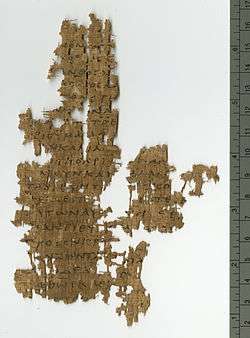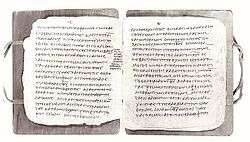1 Peter 2
1 Peter 2 is the second chapter of the First Epistle of Peter in the New Testament of the Christian Bible. The author identifies himself as "Peter, an apostle of Jesus Christ" and the epistle is traditionally attributed to Peter the Apostle, but there are charges that it is a work of Peter's followers in Rome between 70-100 CE.[1][2][3]
| 1 Peter 2 | |
|---|---|
 Fragment containing 1 Peter 1:23–2:5 on Papyrus 125 (3rd/4th century). | |
| Book | First Epistle of Peter |
| Category | General epistles |
| Christian Bible part | New Testament |
| Order in the Christian part | 21 |
Text
The original text was written in Koine Greek. This chapter is divided into 25 verses.
Textual witnesses
Some early manuscripts containing the text of this chapter are:
- Papyrus 72 (3rd/4th century)
- Papyrus 125 (3rd/4th century; extant verses 1–5, 7–12)
- Papyrus 81 (4th century; extant verses 20–25)
- Codex Vaticanus (325–350)
- Codex Sinaiticus (330–360)
- Codex Alexandrinus (400–440)
- Codex Ephraemi Rescriptus (ca. 450; complete)
- Papyrus 74 (7th century; extant verses 6–7, 11–12, 18, 24)
Old Testament references
- 1 Peter 2:3: Psalm 34:8.[4]
- 1 Peter 2:6: Isaiah 28:16
- 1 Peter 2:7: Psalm 118:22
- 1 Peter 2:8: Isaiah 8:14[5]
- 1 Peter 2:22: Isaiah 53:9
Rebirth through the Word (1:22–2:3)
God's chosen people (2:4–10)

Verse 6
- Therefore it is also contained in the Scripture,
- "Behold, I lay in Zion
- A chief cornerstone, elect, precious,
- And he who believes on Him will by no means be put to shame."[8]
- "Behold, I lay in Zion
Citing Isaiah 28:16
Cross reference: Romans 9:33, Ephesians 2:20
Verse 7
- Therefore, to you who believe, He is precious; but to those who are disobedient,
- "The stone which the builders rejected
- Has become the chief cornerstone,"[9]
Citing Psalm 118:22
Verse 8
- and
- "A stone of stumbling
- And a rock of offense."
- They stumble, being disobedient to the word, to which they also were appointed.[10]
Citing Isaiah 8:14,[5] Isaiah 28:16
Verse 9
- But you are a chosen generation, a royal priesthood, a holy nation, His own special people, that you may proclaim the praises of Him who called you out of darkness into His marvelous light;[11]
Citing: Isaiah 62:12
Principles of Conduct in Human Society (2:11–17)
This section addresses the distinctness of the believers' communities which is preserved when their conduct is good by God's standards.[12]
The Principles in Practice (2:18–3:22)
The advice is given to the slaves and wives, two vulnerable groups which is indirectly employed as examples of proper submission for Christians.[12]
See also
References
- Eve 2007, pp. 1263–1264.
- Davids, Peter H. (1982). I Howard Marshall and W. Ward Gasque (ed.). New International Greek Testament Commentary: The Epistle of James (Repr. ed.). Grand Rapids, Mich.: Eerdmans. ISBN 0802823882.
- Evans, Craig A (2005). Craig A. Evans (ed.). Bible Knowledge Background Commentary: John, Hebrews-Revelation. Colorado Springs, Colo.: Victor. ISBN 0781442281.
- Kirkpatrick, A. F. (1901). The Book of Psalms: with Introduction and Notes. The Cambridge Bible for Schools and Colleges. Book IV and V: Psalms XC-CL. Cambridge: At the University Press. p. 838. Retrieved February 28, 2019.
- Kidner, Derek (1994). "Isaiah". In Carson, D. A.; France, R. T.; Motyer, J. A.; Wenham, G. J. (eds.). New Bible Commentary: 21st Century Edition (4, illustrated, reprint, revised ed.). Inter-Varsity Press. p. 640. ISBN 9780851106489.
- 1 Peter 2:2 NKJV
- New King James Version. Copyright © 1982 by Thomas Nelson.
- 1 Peter 2:6 NKJV
- 1 Peter 2:7 NKJV
- 1 Peter 2:8 NKJV
- 1 Peter 2:9 NKJV
- Eve 2007, p. 1266.
Bibliography
- Eve, Eric (2007). "77. 1 Peter". In Barton, John; Muddiman, John (eds.). The Oxford Bible Commentary (first (paperback) ed.). Oxford University Press. pp. 1263–1270. ISBN 978-0199277186. Retrieved February 6, 2019.
External links
- 1 Peter 2 King James Bible - Wikisource
- English Translation with Parallel Latin Vulgate
- Online Bible at GospelHall.org (ESV, KJV, Darby, American Standard Version, Bible in Basic English)
- Multiple bible versions at Bible Gateway (NKJV, NIV, NRSV etc.)